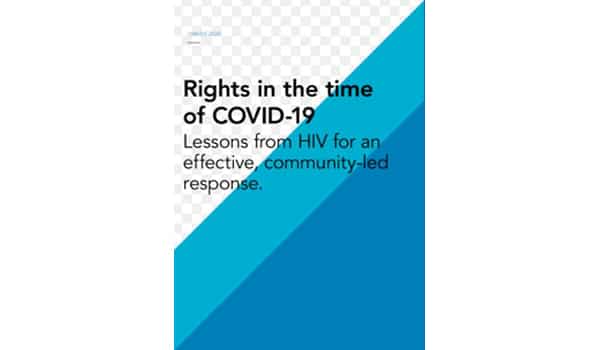
“Right now, we are facing an unpredictable and highly dynamic situation as a global community. However, as we have seen from the solidarity, support and power of communities in the HIV epidemic and already in communities responding to theCovid-19 pandemic, the response must not be fear and stigma. We need to build a culture of solidarity, trust and kindness. Our response to Covid-19 must be grounded in the realities of people’s lives and focused on eliminating the barriers people face in being able to protect themselves and their communities. Empowerment and guidance, rather than restrictions, can ensure that people can act without fear of losing their livelihood, sufficient food being on the table and the respect of their community. Ultimately it will give us a more effective, humane and sustainable response to the epidemic.”(UNAIDS 2020)
The US Centers for Disease Control and Prevention and the International AIDS Society consider PLHIV (people living with HIV) with low CD4+ T-cell count or not on antiretroviral therapy (ART) as potentially vulnerable to more severe Covid-19 disease. This concern is based on data from other respiratory diseases, including pneumococcal pneumonia and pulmonary tuberculosis, where PLHIV with compromised immunity have significantly worse health outcomes. However, the experience from prior coronavirus outbreaks, including SARS and MERS, were limited among PLHIV, suggesting that PLHIV may not have a significantly higher risk of infection or mortality from this new virus.
Since the response to the HIV/AIDS epidemic was developed and refined over decades, some lessons may be applicable for the response to the new virus. First, establishing access to rapid, point-of-care Covid-19 testing in both community-based and clinical settings will be essential.
For several years, WHO has recommended a “Test and Treat” strategy to identify all PLHIV and initiate ART. Second, the mortality rate of HIV-associated TB has declined in part by initiating more PLHIV on ART. Starting ART may improve the immune response to Covid-19 for PLHIV, and may help prevent onset of Cytokine Release Syndrome or progression to severe respiratory failure…With millions of PLHIV receiving ART throughout sub-Saharan Africa, perhaps the best way to protect this population from Covid-19 may be to ensure an uninterrupted supply of ART.
As the Covid-19 response gathers momentum across sub-Saharan Africa, additional research will be needed to fully understand the susceptibility, transmission dynamics, pathogenesis and clinical outcomes of Covid-19 among PLHIV compared to the general population. Those most vulnerable to Covid-19 may be PLHIV who are either unaware of their diagnosis or not yet receiving ART…Since the response will require adequate health care infrastructure, integrating Covid-19 testing services within the HIV treatment infrastructure may be essential for controlling the spread of Covid-19 in sub-Saharan Africa.
SOURCE: EClinical Medicine, by Paul K Drain, Nigel Garrett, 21 April 2020



